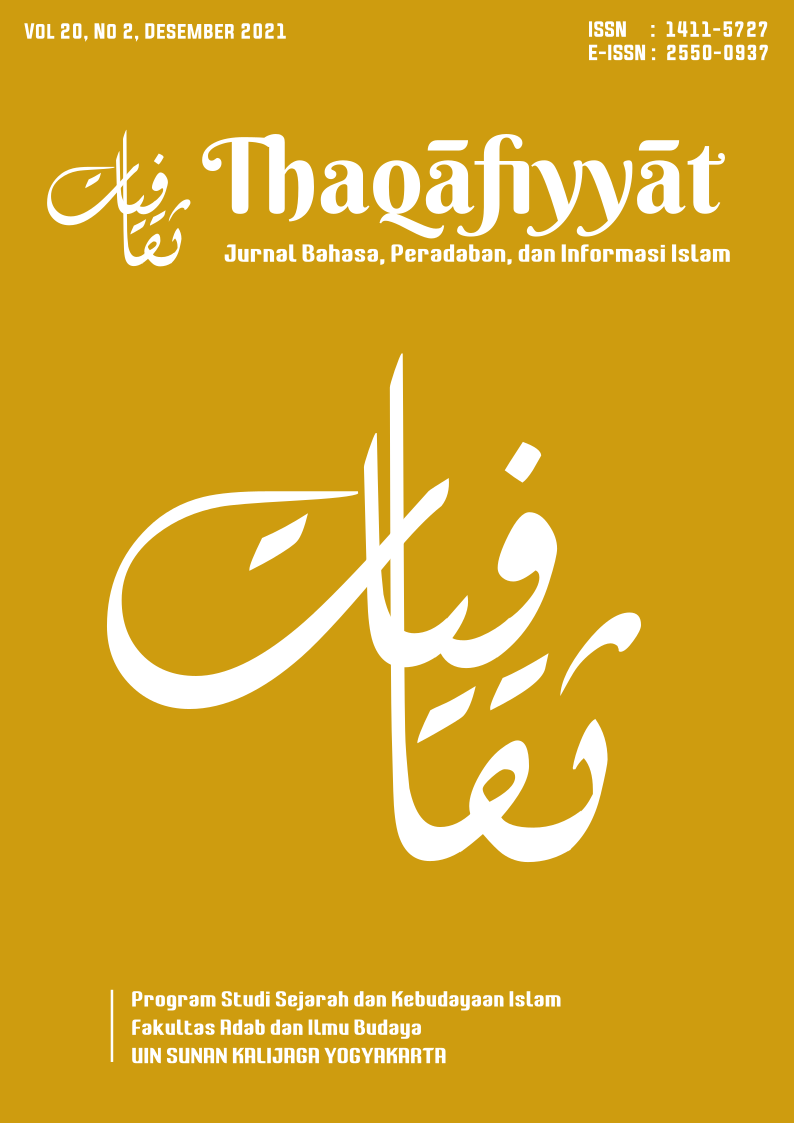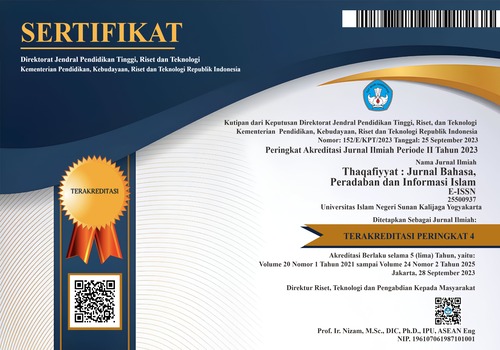Ilmuwan Muslim: Ibnu Sina Pelopor Aromaterapi dan Destilasi Essential Oil
DOI:
https://doi.org/10.14421/thaq.2022.21205Kata Kunci:
Ibnu Sina, aromaterapi, distilasi, al-Qānūn fī at-ṬibbAbstrak
Abstract: The use of essential oils in aromatherapy has numerous positive impacts on mental and physical health. Interestingly, the pioneering scientist in this field was a Muslim scholar, Ibn Sina. The purpose of this research is to investigate the pioneers of essential oil distillation, including the methods used and the first plants that were distilled for aromatherapy. In addition, we aim to explore how Ibn Sina's work became a reference for centuries. The research method employed is descriptive and qualitative. Our findings reveal that Avicenna (381-428 H/980-1037 AD) was the first scientist to invent a distillation apparatus, and he utilized steam distillation to extract essential oils from plants, a method still in use today. The first plant to be distilled was the rose, which made a significant contribution to the development of the fragrance and cosmetic industry. Lastly, Avicenna's book, al-Qānūn Fī at-Ṭibb, translated by Gerard of Cremona, became a mainstay reference in the field of medicine in universities for centuries, up until the 18th century.
Abstrak: Penggunaan minyak atsiri sebagai aromaterapi membawa banyak pengaruh positif dalam bidang kesehatan, baik mental maupun fisik, ternyata pelopornya adalah seorang ilmuwan muslim yaitu Ibnu Sina. Penelitian ini bertujuan untuk mengetahui bagaimana dan siapa perintis pertama penyulingan minyak atsiri, bagaimana metode penyulingan dan tumbuhan pertama yang disuling untuk aromaterapi, serta bagaimana karya Ibnu Sina menjadi rujukan selama berabad-abad. Metode penelitian ini adalah deskriptif kualitatif. Hasil dari penelitian ini adalah Avicenna (381-428 H/980-1037 M) adalah ilmuwan pertama yang menemukan alat penyulingan, dengan metode yang ditemukan adalah penyulingan uap yang masih digunakan sampai sekarang untuk memperoleh minyak atsiri dari tumbuh-tumbuhan. Juga tanaman pertama yang disuling adalah bunga mawar yang memberikan kontribusi besar bagi perkembangan atras dan industri, terakhir adalah kitab al-Qānūn fī at-Ṭibb yang menjadi rujukan selama berabad-abad hingga abad ke-18, yang diterjemahkan oleh Gerard of Cremona dan dijadikan referensi utama dalam bidang kedokteran di perguruan tinggi.
Unduhan
Referensi
Al-Syanwani, Ahmad Muhammad. Mausuah ’Abaqirah Al-Hadharah Al-Ilmiyah Fi Al-Islam. Al-Mamlakah al-’Arabiyah as-Su’udiyyah: Dar az-Zaman, 2008.
Ayubi, Syipam Al. “Variasi Metode Destilasi Pada Sifat Kualitatif Dan Komposisi Kimia Minyak Atsiri Ruku-Ruku (Ocimum Tenuiflorum).” Universitas Islam Indonesia Yogyakarta (2020).
Darwis, Maidar. “Konsep Pendidikan Islam Dalam Perspektif Ibnu Sina.” Jurnal Ilmiah Didaktika 13, no. 2 (2013): 81380.
Elvina, Meity, and Siti Aisyah Hambali. Nutrisi Gen Qu. 1st ed. Jambi: Rumah Nutrisi Gen Qu, 2020.
Fayadh, Sulaiman. Ibnu Sina Abu Al-Thib Al-Basyari. al-Qahiroh: Markaz al-Ahram, 1987.
Handayani, Astuti Budi, and Suyadi Suyadi. “Relevansi konsep akal bertingkat Ibnu Sina dalam pendidikan Islam di era milenial.” Ta’dibuna: Jurnal Pendidikan Islam 8, no. 2 (October 31, 2019): 222–240.
Husein, Ahlam Muhsin. “Al-Thib al-’arabi Wa Atsaruhu ’ala al-Ma’rifah al-Thibbiyyah Fi Eropa.” al-turats al-’ilmi al-’arabi 3 (2015).
Moeljadi, David, Randy Sugianto, Jaya Satrio Hendrick, and Kenny Hartono. “KBBI V 0.4.0 Beta 40.” kbbi.kemdikbud.go.id: App Play Store, 2016.
Mohsin, Tahira, Hira Sarfaraz, and Malik Umar Farooq Gohar. “Antimicrobial Applications of Different Plant Essential Oils.” European Journal of Pharmaceutical and Medical Research 4, no. 7 (2017).
Muchtaridi, and Moelyono. Aromaterapi Tinjauan Aspek Kimia Medisinal. 1st ed. Yogyakarta: Graha Ilmu, 2015.
Naimatullah, Haikal, and Ilyas Malihah. Mausu’ah ’Ulama Al-Thib Ma’a I’tina Khas Bil Athiba Al-’Arab. Beirut: Dar al-Kutub al-Arabi, 1991.
Nur, Abdullah. “Ibnu Sina: Pemikiran Filsafatnya Tentang Al-Fayd, Al-Nafs, Al-Nubuwwah, Dan Al-Wujûd.” HUNAFA: Jurnal Studia Islamika 6, no. 1 (2009).
Özdemİr, Hafize. “Aromatherapy in Nursing Practise Review.” Turkiye Klinikleri J Nurs Sci 5, no. 2 (2013).
Pusat Bahasa Departemen Pendidikan Nasional. Kamus Bahasa Indonesia. Jakarta: Pusat Bahasa, 2008.
Rakhi, R S Menon. “Pharmacological Aspects of Pharmacological Aspects of Essential Oil - Wintergreen Oil.” International Journal of Science and Research (IJSR) 6, no. 7 (2017): 1539–1541.
Ramon, San. “Kilasan Sejarah Essential Oils.” I’m a Young Living Chick, 2013. https://younglivingchick.wordpress.com/kilasan-sejarah-essential-oils/.
Salleh, Sakinah, and Rahimah Embong. “Educational Views of Ibnu Sina.” al-Irsyad: Journal of Islamic and Contemporary Issues 2, no. 1 (2017).
———. “Educational Views of Ibnu Sina.” Al-Irsyad Journal of Islamic and Contemporary Issues 2, no. 1 (2017): 13–24.
Saranraj, P., and V. Durga Devi. “Essential Oils and Its Antibacterial Properties – a Review.” Life Science Archives ( LSA ) 3, no. 2 (2017).
Satis Kumar, K. “Extraction of Essential Oil Using Steam Distillation.” Rourkela: Department of Chemical Engineering National Institute of Technology, 2010.
Tayfun, Kanat. “Aromaterapi.” Journal of Biotechnology and Strategic Health Research (2019). Accessed April 23, 2023.
https://dergipark.org.tr/tr/pub/bshr/issue/49160/548407.
Thormar, Halldor. Lipids and Essential Oils as Antimicrobial Agents. UK: Wiley, 2011.
Tschanz, David W. “Ibn-Sina: ‘The Prince of Physicians.’” JISHIM (2003).
“Distillation in the Manufacture of Essential Oils.” https://essentialoils.co.za/distillation.htm.
Unduhan
Diterbitkan
Terbitan
Bagian
Lisensi
Hak Cipta (c) 2023 Nofa Isman

Artikel ini berlisensiCreative Commons Attribution-NonCommercial-ShareAlike 4.0 International License.
Authors who will publish with this journal agree to the following terms:
- Thaqafiyyat: Jurnal Bahasa, Peradaban dan Informasi Islam publishes all articles entirely in full text.
- It is permissible for readers to download and to use it for scientific purposes and scientific dissemination.
- Authors retain copyright and grant the journal right of first publication with the work simultaneously licensed under a Creative Commons Attribution License that allows others to share the work with an acknowledgement of the work's authorship and initial publication in this journal.
- Authors are able to enter into separate, additional contractual arrangements for the non-exclusive distribution of the journal's published version of the work (e.g., post it to an institutional repository or publish it in a book), with an acknowledgement of its initial publication in this journal.
- Authors are permitted and encouraged to post their work online (e.g., in institutional repositories or on their website) prior to and during the submission process, as it can lead to productive exchanges, as well as earlier and greater citation of published work.









